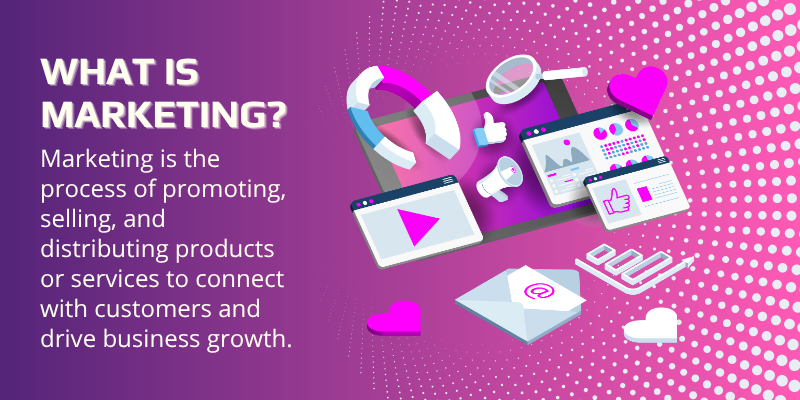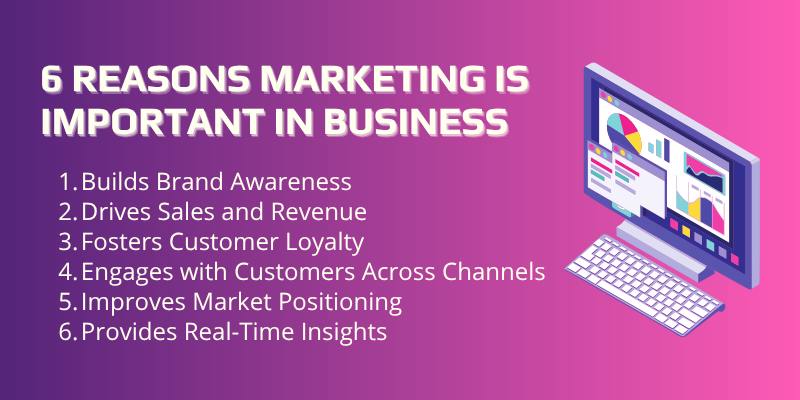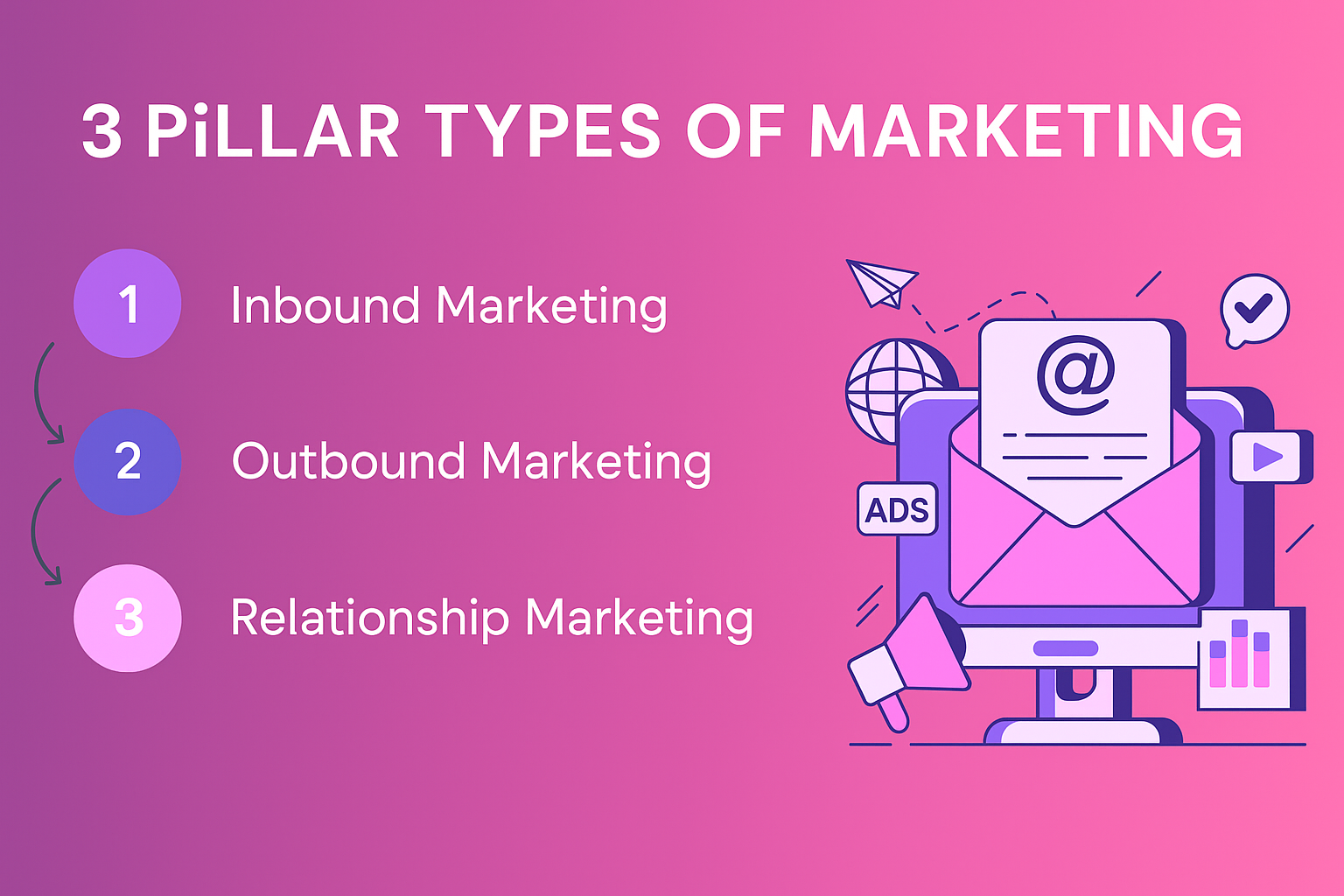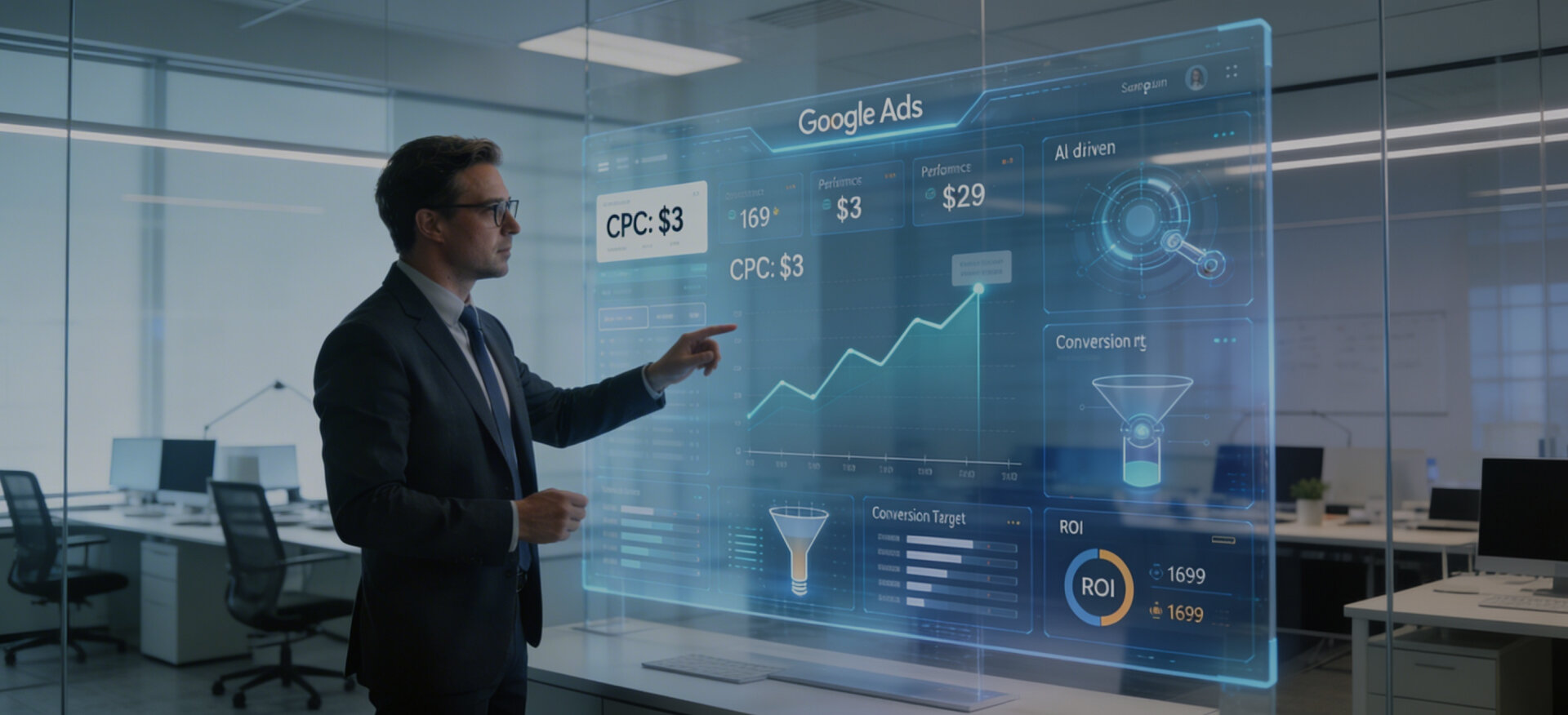Have you ever paused to think about why is marketing important?
It’s easy to get caught up in the daily grind, but when you take a step back, you realize that marketing shapes everything we see, buy, and interact with.
Even if you’ve created the most brilliant product, it won’t matter if no one knows it exists. That’s where marketing steps in, it spreads the word, builds awareness, and creates interest.
It's about creating connections, telling stories, and making people believe in what you stand for.
Every ad, every post, every email, it all contributes to a bigger picture, one where your brand isn’t just seen, but remembered.
This blog delves into why marketing is essential for business growth and how it can help you stand out in today's competitive market.
What is Marketing In Business?
Marketing encompasses the strategies and actions a company uses to attract potential customers to its products or services through compelling messaging.

With the rise of digital marketing, companies now utilize online tools and platforms to target a global audience with more precision and impact.
Its goal is to provide valuable content that stands on its own, offering insights and benefits to both prospects and consumers.
Over time, marketing aims to showcase the value of a product, build brand loyalty, and drive sales growth.
What Is The Purpose of Marketing?
The purpose of marketing is to create awareness, generate interest, and drive demand for a product or service. It helps businesses connect with their target audience, communicate their value proposition, and ultimately influence purchasing decisions.
Marketing also aims to build long-term relationships with customers by fostering trust, delivering value, and strengthening brand loyalty.
Thus, the goal of marketing is to drive business growth, increase sales, and ensure a company’s products or services remain relevant in a competitive market.
Explore Our Digital Marketing Services!
Why Is Marketing Important In Business? 6 Important Reasons
Marketing plays a fundamental role in driving business success by focusing on attracting and retaining customers, creating brand awareness, and communicating brand value effectively.

In particular, B2B marketing has become increasingly important, as businesses now target other businesses directly, building relationships that foster long-term partnerships and mutual growth. It acts as the first point of contact between a business and its target audience, setting the stage for long-term relationships.
The importance of marketing for business generally revolves around the following:
- Builds Brand Awareness
- Drives Sales and Revenue
- Fosters Customer Loyalty
- Engages with Customers Across Channels
- Improves Market Positioning
- Provides Real-Time Insights
Let’s explore each of these.
1. Builds Brand Awareness
Marketing ensures that your brand is visible to your target audience, making it easier for potential customers to recognize and recall your business when they need your products or services.
Platforms like LinkedIn are essential for linkedIn marketing, where professionals can build connections and promote their brand to a more business-oriented audience.
Whether through social media, online ads, or word-of-mouth campaigns, marketing helps you reach a broader audience, increasing the chances of customer interaction and conversion.
The more people are familiar with your brand, the higher the likelihood of them choosing you over competitors.
2. Drive Sales and Revenue
Another reason why is marketing important because it is directly tied to sales growth.
Through effective strategies such as targeted advertising, promotional offers, and email campaigns, marketing motivates potential customers to take action, whether it’s purchasing a product, signing up for a service, or engaging with the brand.
By crafting persuasive messages that highlight the value of your offerings, marketing accelerates the decision-making process, ultimately driving sales and revenue. In today's digital world, data-driven marketing can pinpoint the most effective channels to maximize revenue.
3. Fosters Customer Loyalty
Marketing isn’t just about attracting new customers, it’s also about keeping the ones you have. In performance marketing, businesses measure the direct results of their campaigns, ensuring that the investments made are paying off by fostering customer loyalty through personalized and targeted content.
Consistent engagement through personalized emails, loyalty programs, and social media interactions helps build stronger relationships with your customers.
When people feel valued and connected to your brand, they are more likely to return for repeat purchases and recommend your business to others.
By nurturing these relationships, marketing encourages long-term loyalty, which is often more cost-effective than constantly acquiring new customers.
4. Engages with Customers Across Channels
In the modern business landscape, customers engage with brands through a variety of channels, social media, email, websites, mobile apps, and more.
An important aspect of ecommerce marketing is ensuring that these touchpoints are optimized for smooth transactions and customer engagement, from browsing to checkout.
Marketing strategies today are omnichannel, meaning they are designed to connect with customers wherever they spend their time. By engaging across these various touchpoints, businesses can create a seamless and consistent customer experience.
Whether a person is browsing your social media feed or receiving a personalized email, cohesive marketing helps maintain customer interest and builds stronger connections.
5. Improves Market Positioning
In a market saturated with choices, differentiating your brand is essential. A tech marketing agency can help position your brand in a way that highlights its unique qualities, especially when it comes to tech-related products and services. By crafting clear, compelling messaging, you can stand out from the competition.
Marketing helps position your brand in a way that highlights its unique qualities, whether it’s your product’s quality, price, customer service, or innovation.
Clear, compelling messaging helps customers understand why your brand is the best fit for their needs.
Strong market positioning sets your brand apart from competitors and establishes you as an authority in your industry, making it easier for customers to trust you and choose you over others.
6. Provides Real-Time Insights
One of the biggest advantages of modern marketing is the ability to gather real-time data. Content marketing tools such as Google Analytics and social media platforms provide businesses with insights on campaign performance, enabling them to adjust strategies quickly and improve engagement.
With tools like Google Analytics, social media insights, and customer feedback surveys, businesses can monitor how their marketing efforts are performing instantly.
This allows for quick adjustments to strategies, whether it’s tweaking a campaign that’s not performing well or doubling down on a successful tactic.
Real-time insights ensure that businesses can be more responsive to market trends, consumer behavior changes, and competitor moves, making them more adaptable and agile in a fast-paced environment.
Explore Our Performance Marketing Services!
3 Pillar Types of Marketing
The three pillar types of marketing are often considered as foundational elements that work together to create a successful marketing strategy. These pillars focus on different aspects of how a business engages with its target audience, promotes its products, and builds long-term relationships.

Here are the three key pillars:
1. Inbound Marketing
Inbound marketing focuses on attracting customers through valuable content, engagement, and personalized experiences.
Rather than interrupting potential customers with ads or cold calls, inbound marketing draws them in by offering useful, relevant content that addresses their needs, questions, or pain points.
The goal is to build trust and authority, leading potential customers through the buying process by offering helpful resources at every stage.
Here are the key tactics for inbound marketing:
- Content Marketing: Creating and sharing valuable content such as blogs, videos, and infographics to educate and inform the audience.
- Search Engine Optimization (SEO): Optimizing content to rank higher on search engines and drive organic traffic.
- Social Media Marketing: Engaging with customers on platforms like Facebook, Instagram, and Twitter to build relationships and promote content.
- Email Marketing: Sending personalized emails with relevant content and offers to nurture leads and maintain engagement.
- Lead Nurturing: Developing workflows and automated emails to guide prospects through the buyer’s journey.
Inbound marketing is about creating meaningful connections by providing value upfront, leading to increased customer engagement and ultimately conversion. This strategy is often seen as more sustainable and cost-effective over time compared to traditional approaches.
2. Outbound Marketing
Outbound marketing refers to more traditional, proactive marketing techniques where businesses push their message to a broader audience, typically through paid channels.
While this strategy can help businesses reach large groups of potential customers quickly, it tends to be less targeted than inbound marketing.
The main aim of outbound marketing is to generate immediate awareness and drive quick action.
Here are the key tactics for outbound marketing:
- Television and Radio Ads: Reaching large audiences with broadcast media.
- Print Advertising: Ads in newspapers, magazines, or flyers to increase brand awareness.
- Cold Calling: Reaching out directly to potential customers via phone calls to pitch products or services.
- Direct Mail: Sending physical advertisements or catalogs to homes or businesses to encourage purchases.
- Paid Advertising: Pay-per-click (PPC), display ads, or social media ads to attract immediate attention and generate leads.
Although outbound marketing may be seen as more aggressive, it remains an effective way to generate leads and boost brand visibility, especially when targeting a wide audience.
However, its effectiveness can be maximized when integrated with inbound strategies for more comprehensive results.
3. Relationship Marketing
Relationship marketing is all about building long-term, meaningful connections with customers. Rather than focusing solely on acquiring new customers, this strategy centers on retaining existing ones by creating a personalized, consistent experience that nurtures loyalty.
By understanding and meeting customers' evolving needs, businesses can improve satisfaction, boost retention rates, and turn customers into advocates for the brand.
Here are the key tactics for relationship marketing:
- Customer Loyalty Programs: Offering rewards or discounts to repeat customers to encourage continued business.
- Personalized Communication: Tailoring messages, offers, and content based on customer behavior and preferences.
- Customer Service Excellence: Providing exceptional, timely customer support to resolve issues and create positive experiences.
- Follow-ups: Sending thank-you emails, surveys, or satisfaction check-ins after purchases to show customers they are valued.
- Referral Programs: Encouraging satisfied customers to refer friends and family in exchange for incentives.
Relationship marketing ensures that customers feel valued, not just as consumers, but as partners in the brand’s journey. By maintaining regular and meaningful interactions, businesses can foster loyalty, which in turn drives long-term success and growth.
Frequently Asked Questions (FAQs)
Why is marketing essential for a business?
Marketing creates awareness, attracts customers, communicates value, and differentiates you from competitors—driving sales and long-term growth.
How does marketing impact revenue?
It generates demand, nurtures leads, and shortens sales cycles, turning interest into purchases and repeat business through consistent messaging and reach.
What’s the difference between marketing and sales?
Marketing builds awareness and interest at scale; sales closes the deal with qualified prospects. Both must align on goals, messaging, and timing.
Can marketing work for small businesses?
Strategic, low-cost methods (local SEO, content, social media, partnerships) can create high leverage and competitive advantage.
How do I measure marketing effectiveness?
Use metrics like reach, engagement, lead quality, conversion rate, CAC (customer acquisition cost), LTV (lifetime value), and ROI. Track goals and adjust.
What is the importance of digital marketing today?
Digital marketing reaches a global, measurable audience with targeted, scalable tactics, enabling real-time optimization and faster learning.
Why is marketing management important?
It ensures effective brand positioning, customer connection, and business growth by optimizing marketing resources.
How does a marketing strategy impact business performance?
It drives growth by increasing customer acquisition and retention, leading to higher profitability and market success.
Conclusion
Why is marketing important? In simple terms, marketing is the heart of every business, linking purpose, products, and people in a way that drives long-term growth. Businesses may also choose to work with a marketing agency to develop strategies that align with their goals, ensuring that they receive expert guidance and tailored solutions. It acts as the bridge between a company and its target audience, ensuring that the brand’s values are communicated effectively while meeting the needs of customers. With the right marketing strategies, businesses can raise awareness, build trust, nurture customer loyalty, and ultimately, pave the way for sustainable success. Marketing goes beyond just selling, Marketing goes beyond just selling, and companies like Centric play a crucial role in developing strategies that support every aspect of business growth. It’s the foundation that supports every aspect of business development, making it essential for any company aiming for lasting impact and profitability.









